About the Author
 John Henry Newman, C.O. (21 February 1801 11 August 1890), also referred to as Cardinal Newman and Blessed John Henry Newman, was an important figure in the religious history of England in the 19th century. He was known nationally by the mid-1830s.
John Henry Newman, C.O. (21 February 1801 11 August 1890), also referred to as Cardinal Newman and Blessed John Henry Newman, was an important figure in the religious history of England in the 19th century. He was known nationally by the mid-1830s.
Originally an evangelical Oxford academic and clergyman in the Church of England, Newman was a leader in the Oxford Movement. This influential grouping of Anglicans wished to return the Church of England to many Catholic beliefs and forms of worship. He left the Anglican church and converted to Roman Catholicism (1845), eventually being granted the rank of Cardinal by Pope Leo XIII.
His beatification was officially proclaimed by Pope Benedict XVI on 19 September 2010 during his visit to the United Kingdom.
Source: Wikipedia
An Essay
In Aid Of
A Grammar Of Assent.
by
John Henry Newman,
Of the Oratory.
Non in dialectic complacuit Deo salvum facere populum suum.
ST. AMBROSE.
London:
Burns, Oates, & Co.
17 & 18, Portman Street, and 63, Paternoster Row.
1874
CONTENTS
Assent And Apprehension. Modes Of Holding And Apprehending Propositions. Modes of Holding Propositions. Modes of apprehending Propositions. Assent Considered As Apprehensive. The Apprehension Of Propositions. Notional And Real Assent. Notional Assents. Real Assents. Notional and Real Assents Contrasted. Apprehension And Assent In The Matter Of Religion. Belief in One God. Belief in the Holy Trinity. Belief in Dogmatic Theology. Assent And Inference. Assent Considered As Unconditional. Simple Assent. Complex Assent. Certitude. Assent and Certitude Contrasted. Indefectibility of Certitude. Inference. Formal Inference. Informal Inference. Natural Inference. The Illative Sense. The Sanction of the Illative Sense. The Nature of the Illative Sense. The Range of the Illative Sense. Inference And Assent In The Matter Of Religion. Natural Religion. Revealed Religion.
DEDICATION.
ToEdward Bellasis,Serjeant At Law,In RemembranceOf A Long, Equable, Sunny Friendship;In GratitudeFor Continual Kindnesses Shown To Me,For An Unwearied Zeal In My Behalf,For A Trust In Me Which Has Never Wavered,And A Prompt, Effectual Succour And SupportIn Times Of Special Trial,From His AffectionateJ. H. N.
February 21, 1870.
PART I.
ASSENT AND APPREHENSION.
Chapter I.
Modes Of Holding And Apprehending Propositions.
1. Modes of Holding Propositions.
1. Propositions (consisting of a subject and predicate united by the copula) may take a categorical, conditional, or interrogative form.
(1) An interrogative, when they ask a Question, (e. g. Does Free-trade benefit the poorer classes?) and imply the possibility of an affirmative or negative resolution of it.
(2) A conditional, when they express a Conclusion (e. g. Free-trade therefore benefits the poorer classes), and both imply, and imply their dependence on, other propositions.
(3) A categorical, when they simply make an Assertion (e. g. Free-trade does benefit), and imply the absence of any condition or reservation of any kind, looking neither before nor behind, as resting in themselves and being intrinsically complete.
These three modes of shaping a proposition, distinct as they are from each other, follow each other in natural sequence. A proposition, which starts with being a Question, may become a Conclusion, and then be changed into an Assertion; but it has of course ceased to be a question, so far forth as it has become a conclusion, and has rid itself of its argumentative formthat is, has ceased to be a conclusion,so far forth as it has become an assertion. A question has not yet got so far as to be a conclusion, though it is the necessary preliminary of a conclusion; and an assertion has got beyond being a mere conclusion, though it is the natural issue of a conclusion. Their correlation is the measure of their distinction one from another.
No one is likely to deny that a question is distinct both from a conclusion and from an assertion; and an assertion will be found to be equally distinct from a conclusion. For, if we rest our affirmation on arguments, this shows that we are not asserting; and, when we assert, we do not argue. An assertion is as distinct from a conclusion, as a word of command is from a persuasion or recommendation. Command and assertion, as such, both of them, in their different ways, dispense with, discard, ignore, antecedents of any kind, though antecedents may have been a sine qu non condition of their being elicited. They both carry with them the pretension of being personal acts.
In insisting on the intrinsic distinctness of these three modes of putting a proposition, I am not maintaining that they may not coexist as regards one and the same subject. For what we have already concluded, we may, if we will, make a question of; and what we are asserting, we may of course conclude over again. We may assert, to one man, and conclude to another, and ask of a third; still, when we assert, we do not conclude, and, when we assert or conclude, we do not question.
2. The internal act of holding propositions is for the most part analogous to the external act of enunciating them; as there are three ways of enunciating, so are there three ways of holding them, each corresponding to each. These three mental acts are Doubt, Inference, and Assent. A question is the expression of a doubt; a conclusion is the expression of an act of inference; and an assertion is the expression of an act of assent. To doubt, for instance, is not to see ones way to hold that Free-trade is or that it is not a benefit; to infer, is to hold on sufficient grounds that Free-trade may, must, or should be a benefit; to assent to the proposition, is to hold that Free-trade is a benefit.
Moreover, propositions, while they are the material of these three enunciations, are the objects of the three corresponding mental acts; and as without a proposition, there cannot be a question, conclusion, or assertion, so without a proposition there is nothing to doubt about, nothing to infer, nothing to assent to. Mental acts of whatever kind presuppose their objects.
And, since the three enunciations are distinct from each other, therefore the three mental acts also, Doubt, Inference, and Assent, are, with reference to one and the same proposition, distinct from each other; else, why should their several enunciations be distinct? And indeed it is very evident, that, so far forth as we infer, we do not doubt, and that, when we assent, we are not inferring, and, when we doubt, we cannot assent.
And in fact, these three modes of entertaining propositions,doubting them, inferring them, assenting to them, are so distinct in their action, that, when they are severally carried out into the intellectual habits of an individual, they become the principles and notes of three distinct states or characters of mind. For instance, in the case of Revealed Religion, according as one or other of these is paramount within him, a man is a sceptic as regards it; or a philosopher, thinking it more or less probable considered as a conclusion of reason; or he has an unhesitating faith in it, and is recognized as a believer. If he simply disbelieves, or dissents, he is assenting to the contradictory of the thesis, viz. that there is no Revelation.
Many minds of course there are, which are not under the predominant influence of any one of the three. Thus men are to be found of irreflective, impulsive, unsettled, or again of acute minds, who do not know what they believe and what they do not, and who may be by turns sceptics, inquirers, or believers; who doubt, assent, infer, and doubt again, according to the circumstances of the season. Nay further, in all minds there is a certain coexistence of these distinct acts; that is, of two of them, for we can at once infer and assent, though we cannot at once either assent or infer and also doubt. Indeed, in a multitude of cases we infer truths, or apparent truths, before, and while, and after we assent to them.
Next page
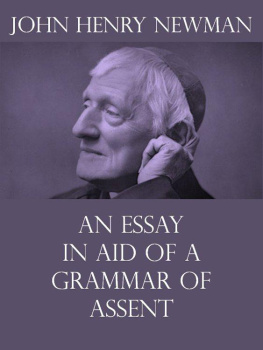
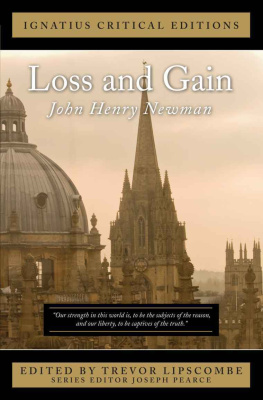
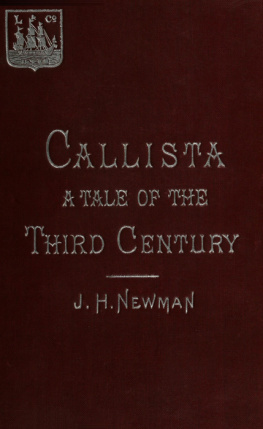
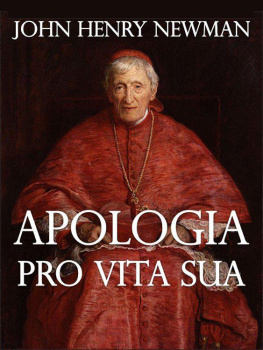
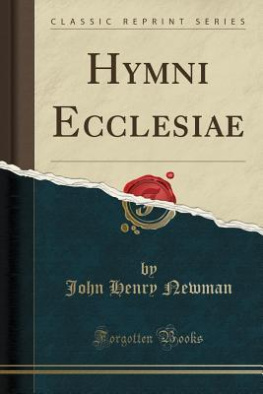
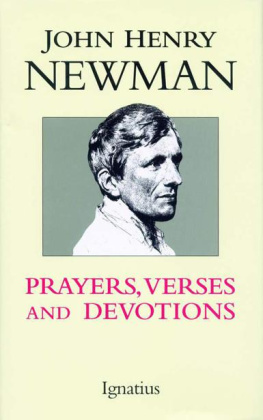
![Blessed John Henry Newman - Blessed John Henry Newman Collection [26 Books]](/uploads/posts/book/371011/thumbs/blessed-john-henry-newman-blessed-john-henry.jpg)

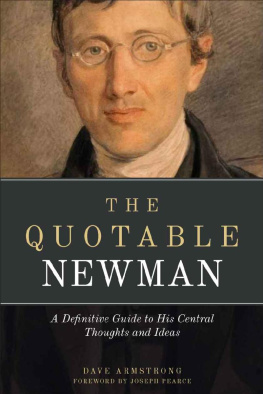
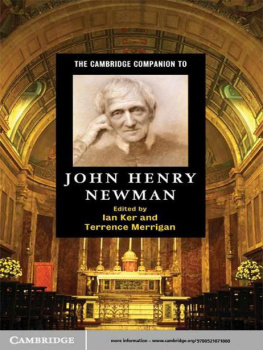
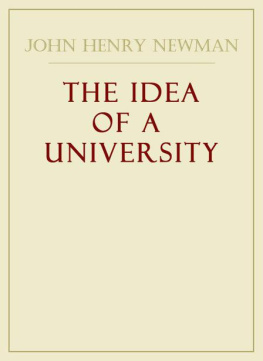
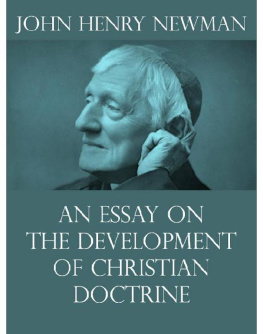
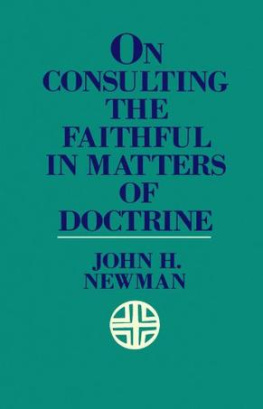
 John Henry Newman, C.O. (21 February 1801 11 August 1890), also referred to as Cardinal Newman and Blessed John Henry Newman, was an important figure in the religious history of England in the 19th century. He was known nationally by the mid-1830s.
John Henry Newman, C.O. (21 February 1801 11 August 1890), also referred to as Cardinal Newman and Blessed John Henry Newman, was an important figure in the religious history of England in the 19th century. He was known nationally by the mid-1830s.